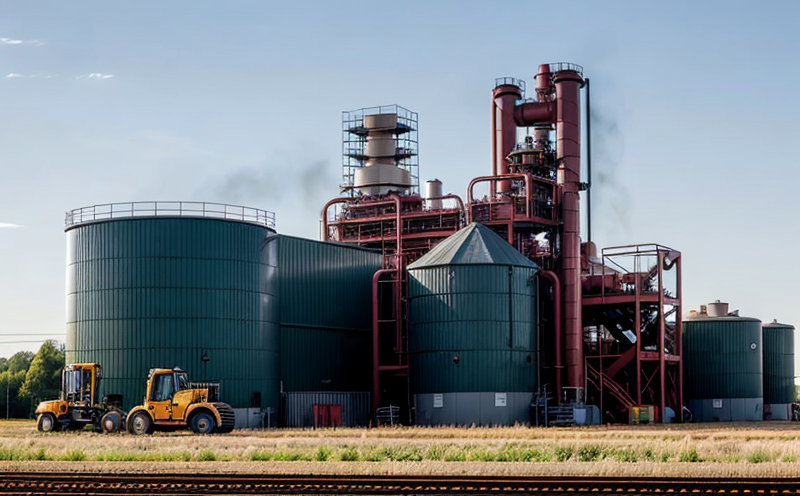ISO 14159 Food Processing Machinery Noise Testing
The ISO 14159 standard specifies methods to measure and evaluate noise emissions from machinery used in food processing industries. This service is crucial for ensuring that the equipment meets stringent safety and hygiene standards, thereby safeguarding both consumer health and compliance with international regulations.
Food processing machinery operates under challenging environmental conditions, often involving high temperatures, humidity, and corrosive substances. Therefore, noise testing plays a pivotal role in assessing potential risks to workers' hearing as well as the overall industrial environment. Compliance with ISO 14159 ensures that machinery is designed and operated safely, minimizing noise pollution and promoting sustainable practices.
The standard mandates precise measurement techniques, including the use of octave-band filters and sound level meters, which are calibrated according to international standards like IEC and EN. These instruments ensure accurate data collection for subsequent analysis. The testing process involves placing the machinery in a controlled environment where the noise levels can be measured at various operational speeds and load conditions.
The ISO 14159 protocol also emphasizes the importance of specifying reference points and background noise levels to accurately assess the machine's contribution to overall noise pollution. This approach ensures that any identified issues are attributable to the machinery in question, rather than external factors such as ambient noise or other equipment.
Compliance with ISO 14159 is not only a requirement for manufacturers but also an essential part of quality assurance programs. By adhering to this standard, food processing companies can demonstrate their commitment to worker safety and environmental responsibility. The results of these tests are typically documented in comprehensive reports that include detailed specifications of the machinery tested, operational parameters used during testing, and recommendations for noise reduction measures.
Understanding the implications of non-compliance is critical; failure to meet ISO 14159 standards can lead to significant legal and reputational risks. It may result in product recalls, fines, or even suspension from operating within certain jurisdictions. In addition to potential penalties, there are also broader impacts such as increased insurance premiums and reduced consumer trust.
The testing process involves several steps that require meticulous attention to detail. First, the machinery is prepared according to manufacturer specifications, ensuring it operates under conditions that mimic real-world use. Then, noise measurements are taken using calibrated equipment positioned at specific reference points around the machine. These readings are recorded and analyzed to determine compliance with ISO 14159 criteria.
Once testing is complete, detailed reports are generated summarizing all findings. These documents include a summary of test conditions, measured values, and recommendations for any necessary adjustments or improvements. Compliance officers and R&D engineers can use this information to make informed decisions about future product development and operational practices.
Environmental and Sustainability Contributions
- Reduces noise pollution in industrial environments, promoting better working conditions for employees.
- Contributes to safer operating conditions by identifying potential hazards early on.
- Promotes sustainable practices by ensuring efficient machinery operation with minimal noise impact.
The ISO 14159 standard plays a vital role in reducing the environmental footprint of food processing industries. By minimizing noise pollution, companies can contribute to quieter and healthier communities while improving their own operational efficiency. This aligns closely with broader sustainability goals aimed at creating more sustainable and responsible businesses.
Use Cases and Application Examples
| Application Example | Description |
|---|---|
| Fruit Picking Machines | Ensuring low noise levels during operations to protect workers' hearing. |
| Bread Baking Ovens | Monitoring noise emissions to comply with local regulations and maintain a safe working environment. |
| Cheese Molding Machines | Testing for compliance before market release to meet international safety standards. |
| Packaging Machinery | Evaluating noise levels during packaging operations to enhance worker comfort and safety. |
- Fruit picking machines operate in noisy environments, making ISO 14159 testing essential for protecting workers' hearing.
- Bread baking ovens generate significant heat and noise; regular testing ensures compliance with local regulations.
- Cheese molding machines must meet strict hygiene standards; noise testing verifies that they adhere to international safety norms.
- Packaging machinery, while not directly involved in food production, still benefits from ISO 14159 testing to ensure a safe working environment for operators.
These examples illustrate how ISO 14159 noise testing is applied across different types of machinery used in the food processing sector. By adhering to this standard, companies can enhance both worker safety and environmental sustainability.
Eurolab Advantages
Eurolab offers unparalleled expertise and experience in conducting ISO 14159 noise testing for machinery used in the food processing industry. Our team of professionals is committed to delivering accurate, reliable results that meet international standards.
- Comprehensive Testing: We provide a full range of services tailored to your specific needs, ensuring thorough and precise measurements.
- State-of-the-Art Equipment: Our laboratory uses the latest calibrated instruments to ensure accurate data collection.
- Expertise and Experience: Eurolab's team comprises highly skilled professionals with extensive experience in acoustics and vibration testing.
- Rapid Turnaround: We offer quick turnaround times for test results, allowing you to make timely decisions regarding your machinery.
- Comprehensive Reporting: Detailed reports are provided summarizing all findings and offering actionable recommendations for improvement or compliance.
Choose Eurolab for ISO 14159 noise testing; we ensure that your food processing machinery meets the highest standards of safety and hygiene, contributing to a safer working environment and promoting environmental sustainability.





